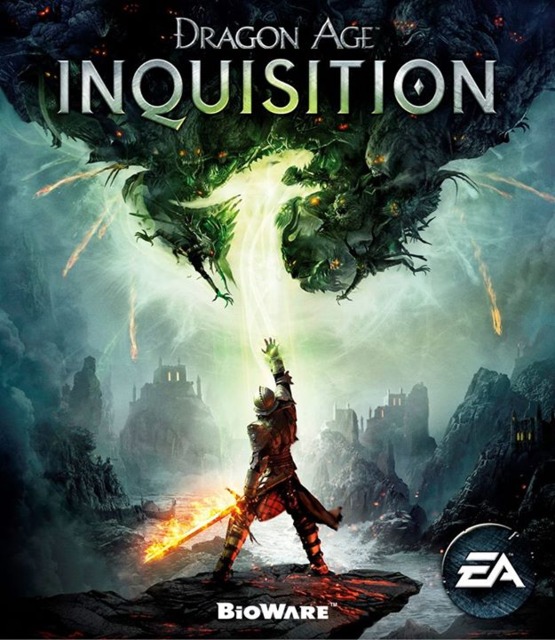Strike three.
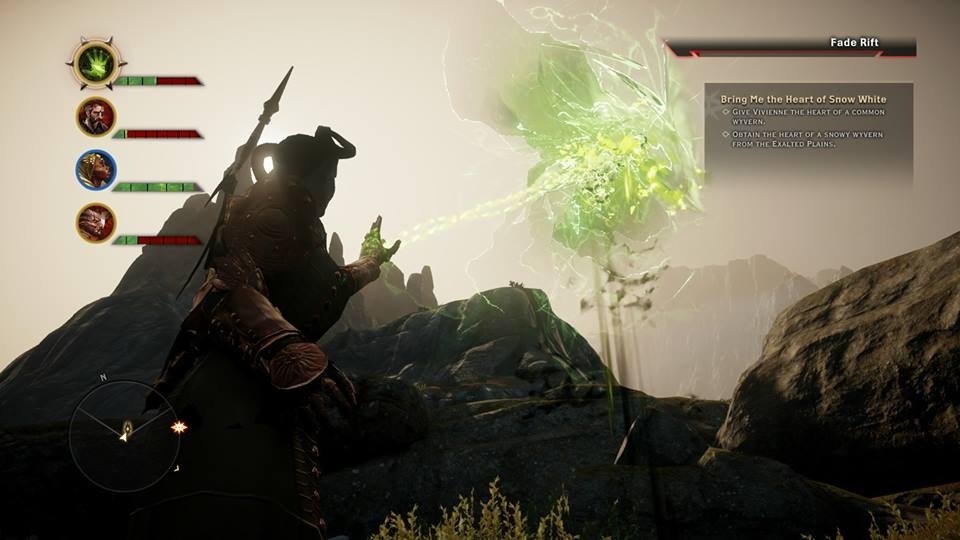
Dragon Age II was... a rather polarising game, to say the least. Its rushed development cycle lead to a lot of blatant corner cutting, with much of the many hallmarks of Dragon Age: Origins torn away with little to make up for it. Though now we have Dragon Age: Inquisition, the third entry in the series and one that's been allowed some actual legroom for BioWare to really flex their muscles and go for something bigger than either of its predecessors! Bigger doesn't necessarily equate to better, however.
Inquisition is set during the aftermath of Dragon Age II when the tensions between Mages and the Templars--the mages' oppressors--are at full swing. In an attempt to quell the calamity, both factions opt to meet at the Temple of Sacred Ashes, however a massive explosion ends up killing all within -- all except you. Who you are at first makes for a great introduction. No longer are you shackled with the mundane restriction of being human, and can now once again choose to also be a dwarf, elf, or even one of the tall, (possibly) horned Qunari -- a first for the series.
The character creator is relatively robust, though it still pales in comparison to the likes of Dragon's Dogma's. The hair selection in particular is incredibly weak, and much of the facial hair options look hideous. Beards resemble the plastic novelty variety, and stubble looks akin to someone dotting around your character's face with a felt-tip pen. The inclusion of a Qunari option perhaps by default makes this Dragon Age's best character creator thus far, but still... those are some pretty damn ugly hair options you have there. It should also be noted that you can't edit your character mid-game, either. So you better make damn sure you're happy with what you have before you press that confirm button. Unfortunately, what little niggles I have with the character creator don't even begin to measure up with what else I have problems with.
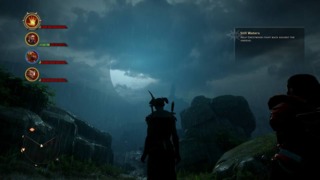
Taking some very obvious cues from 2011's RPG epic Skyrim, Inquisition was stated to be BioWare's biggest game they've ever developed. They're not wrong, however much of the game's scale is put to little use beyond boring busywork. Inquisition isn't open world per se, but rather you have your homebase that functions as a HUB, where you can then unlock and travel to multiple different areas, not entirely unlike how Dragon Age: Origins functioned. The environments vary in size, but they're all much larger than most of what the series has seen to date. They all look stunning at that, and there are a number of beautiful vistas that are really rather fetching to the eye. However the open nature of the game's environments merely run skin deep.
Much of the quest design follows that of something resembling a single-player MMORPG. You'll wander around these vast expanses, picking up quests noted by the staple exclamation point we're all accustomed to, and you'll find that there is certainly a significant bevvy on content on hand. However, the majority play out as a bunch of piecemeal fetch quests that simply involve you talking to Quest Giver, heading over yonder to collect Item or kill Thing, and then returning for your Reward. What they notably lack is typically what I would assume most come to BioWare games for, and that's character interaction. There's very little actual discussion or diplomacy going on amidst these quests; you'll simply talk to person, ask what they want, then go and do it. Once you return you simply note that you've done what they asked and accept your reward. It's all rather straightforward and completely clashes with the way quests could pan out in games like the KOTOR series or, more importantly, Dragon Age: Origins.
Origins in particular often allowed you to steer many of the game's quests and character interactions in pretty drastic directions. This would typically mean you could potentially kill the quest giver, or demand more of a reward; you could blackmail, lie, persuade, or even turn away your reward for the more altruistic playthroughs. Inquisition seemingly has none of that, however. Collecting flowers, killing stray bandits, and setting landmark points are the order of the day unfortunately. The only one example I can think of that harkens back to the moral ambiguity of Origins is a quest involving your elven apostate mage companion Solas, where you will encounter a Dalish mage. Upon working with her in killing some demons in a dungeon, she collects a trinket to keep for herself. From there you're given the prompt to kill her, or could alternatively have Solas persuade her to give it to you, or you could just end the quest then and there with her keeping the trinket.
This is particularly disappointing for the slightly more involved quests, such as one that had me invade this secret dwarven carta base. As a dwarf character myself, with a history in the carta at that, that should have spelled out excitement as I perhaps use my history to... I dunno, do something other than just slaughter my way through everything? Unfortunately, no, that's all the quest entailed, as do the rest of them. Sometimes a person of importance may instead be brought to you to be judged back at homebase, but that there's zero potential for diplomacy out in the field itself is still unfortunate regardless.
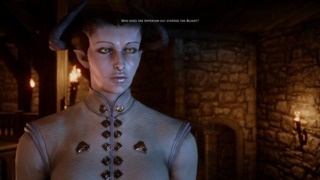
Another good example is with my alternate Qunari character after encountering a Spirit in Old Crestwood. It's all perturbed because it doesn't have the freedom of manipulation in our world as it does in the mysterious and magical dream world called The Fade. Now, I've been roleplaying my Qunari as someone that doesn't trust spirits/demons and as such even decided to cast the enigmatic sort-of-Spirit companion Coleaway -- I'd have killed him if it was possible. But for this specific quest, there's no actual option besides doing as the spirit says and heading to this dungeon and killing a Rage Demon. I could alternatively just decline the quest, but there should be a better method for being able to wrap the quest up without simply declining the quest; there should be a way for it to be ticked off and ostensibly 'completed' without bending to the quest giver's demands. With the way I've played my Qunari she would have reactively attempted to cut the spirit down if possible; even if the spirit flees or what have you or is invulnerable for whatever reason, at least give me the option. Part of what I love about Origins in particular is how you can define your character not only with the bigger decisions, but the smaller ones you're constantly having to make as well.
As I wander about the vast expanse of the game's many environments and uncover a new town and the like, I should be excited at the prospect of seeing what I could find! What stories I could uncover and take part in, but instead it's usually a sense of preempted exhaustion. When I unlock a new area I already know what's in store: collecting stuff and killing things. Attack first, ask questions maybe, make decisions never. When you do engage in conversations, most involve you and whoever just standing there, with no dynamic camera angles or anything. They are painfully flat and monotonous, and again much of the actual conversation simply involves you asking questions with few opportunities to react. It's less of a dialogue tree and more just a branch. Many of the animations for the more cinematic cutscenes are all incredibly dated, too; most I can recognise from as far back as the original Mass Effect. And on that note, given the many influences Dragon Age has been taking from Mass Effect, it's disappointing that of all things they still haven't included any sort of mid-conversation interrupts like the Paragon/Renegade prompts.
To be fair, much of the game's side content is technically optional, but when you look at the entirety of what the game offers, the junk side stuff overwhelms much of the actual story content. And even then, because the handful of story missions require that you spend 'Power' to undertake, which you accumulate by completing side content, you're going to have to engage in much of the game's ''optional'' side content to a certain degree. When playing on Hard mode at that, you'll have to complete side content to be able to keep up with the recommended levels for the story missions at that. You could possibly turn the difficulty down, although its Normal setting is far too easy.
While the majority of the side content may be something of a misfire, the story itself unfortunately doesn't fair much better. The core plot itself is pretty standard BioWare fair, involving an ancient deity who wants to make the world a-new and it's up to you to raise an army to ect. ect. The main villain of the game makes for a pretty memorable introduction, however as it continues onward he ceases to leave much of an impression. He never amounts to much and rarely feels like the sort of threatening presence the game wants him to be; he just doesn't actually do a whole lot throughout the narrative. There are no curveballs or twists of any drastic nature in a game that could have sorely done with a few, and the game ends pretty much how you would likely expect it to. Simply put much of the actual story beats are rather predictable and just plain dull even.
The actual story missions are all primarily combat focussed, which only makes the heavy focus on combat throughout much of the side content to feel even more one-note. Though there is one interesting story mission that has you attempt to play 'The Game'. An Orlesian (Fantasy French) mixture of politics, espionage, backstabbing and intrigue -- real cloak & dagger sort of shenanigans where everybody is trying to put on the fakest smile while they shove a stiletto into each other's back. It's a fascinating concept, one that has been referred to many times in the series' past. However the mission itself doesn't do the bestest job in replicating the concept's infamy. For the most part what it entails you to do is run around... collecting stuff. You must also eavesdrop on conversations and make the occasional dialogue option, but it all tends to feel rather clumsy. That there's technically a timer amidst it all only adds to the messy nature of the mission. 'The Game' is so ambitious of a concept that it feels like it would be more befitting of its very own video game, as when presented within the constraints of this action-focussed RPG, it begins to collapse under the weight of such a grandiose idea.
My issues with the story aspect of the game don't end there, however. Decision making is often seen as the lifesource of BioWare RPGs. They allow you the opportunity to build your own character and make your playthrough your own, up until a point of course. However as the years have gone by, your own input and the influence you hold continues to become more and more irrelevant. Sure, there a number of decisions you can make, but none ever seem to hold any weight. Many are of the binary variety and don't quite feel as naturally implemented as they have done in the past, but what's worse is how little consequence they hold. Many of your decisions lead to situations so similar that the decision itself frankly feels like a formality; a way to give the player the illusion that they're deciding on a course to take. I had talked with a friend of mine who had made different decisions to my own, yet was disappointed to find that we still practically got the same results each time.
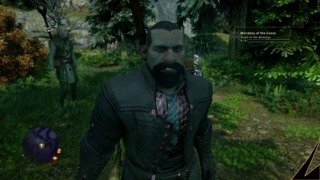
Your companions and their approval/disapproval of your decisions was the catalyst for your morality in previous games. Making certain decisions to push away a certain character could end in their betrayal of you, if they don't simply decide to at least leave your company. However that's not the case in Inquisition. Regardless of what your party members seemingly think of you, they will never step out of line and will always be willing to share much of their own personal backstory. With my Qunari character, I strived to be as much of a right bastard as I could--especially towards certain characters as the religiously devoted Cassandra and Leliana--but not only are there so few truly earth-shattering decisions for you to make, regardless of how much of a bitch I may act towards my companions it never amounted to anything of note.
There was one instance where I made a large-scale decision tied pretty closely to one of my companions, one that I would have assumed would remove him from my party. Upon making the decision, however, rather than finally being done with my bullshit, he actually asked me if he should leave, erasing a part of the character's individuality in the process. Oh sure, he disapproved plenty, but his disapproval in the grand scheme means nothing; a mere slap on the wrist compared to the potential murder you would have to inflict in Dragon Age games of the past. Suffice it to say, Inquisition sorely lacks the flexibility that this series once held. Even Dragon Age II I would go as far as to say held more consequence for your actions.
And it's not over yet! For then there's that blasted dialogue wheel, the bane of an RPG's existence. Your Inquisitor character also of course continues to have a voice, and you can even select between two voices per gender (which is impressive given the amount of dialogue), but that isn't what I have an issue with. The dialogue wheel as first introduced in Mass Effect essentially narrows down your choices and what your character will say to the gist. On one hand it makes for a suitable method in streamlining what choices function as questions that you can wrap back around to, and what choices will actually move the conversation forward. The problem, however, is that can often create a noticeable divide between what you choose your character to say, and what will actually come out of your character's mouth. One such example involved a companion quest, one that was quite sombre in tone. As the companion sat beside a dying loved one, I opted for the dialogue choice of ''I don't know what to say'', only to then hear my character say out loud ''Well... shit''. Wasn't quite what I was going for if I'm being honest. And while it isn't doesn't happen too often, your character will sometimes speak for him/herself, further separating the link between the player and their character. Despite allowing you to once again select from a series of races for your character, the dialogue wheel continues to inhibit the amount of roleplaying potential that made Origins in particular such a standout game for its generation.
Most likely go by the notion that the core plot of BioWare games are never really the focal point of the games, and that it's the characters that deserve the attention. Fortunately Inquisition does have itself a decent selection of personalities. Iron Bull is a particular favourite of mine as the one-eyed Qunari merc; he's a bit rough-around-the-edges, but still imbued a sense of camaraderie between he and my character. The mysterious and stoic Solas is another highlight, for his unwavering dedication to knowledge concerning the magical Fade world, and his ability to always have a clever analogy on hand to throw your way should you question his beliefs. The powerful mage Vivienne and her snooty, holier-than-thou exterior will no doubt clash with some, but her more traditional views towards the controlling of mages makes for an intriguing perspective. While each companion does also have their own quest, most aren't especially interesting and pale in comparison to the Loyalty missions in Mass Effect 2 in particular. They're still perhaps some of the best content in the game, but they vary in quality per character and are often extremely short.
For an RPG to have such a strong emphasis on the combat (much more so than its predecessors), it's outright baffling as to why they would cut down your party scriptings and patterns so drastically. No longer can you customise how your party members will act and react under certain situations, instead forcing you to micromanage practically every action. You can still allow your party to use their abilities, but they rarely ever use them when it feels the most appropriate, often leaving me to then wait for the ability to finish its cooldown should I want to use it. If I for example have my crossbow-wielding companion Varric's Caltrops ability turned on, he will then often proceed to rush right into the thick of combat and throw them on the ground, even though it's supposed function as a defensive ability to allow him to escape from the very situations he's rushing into.
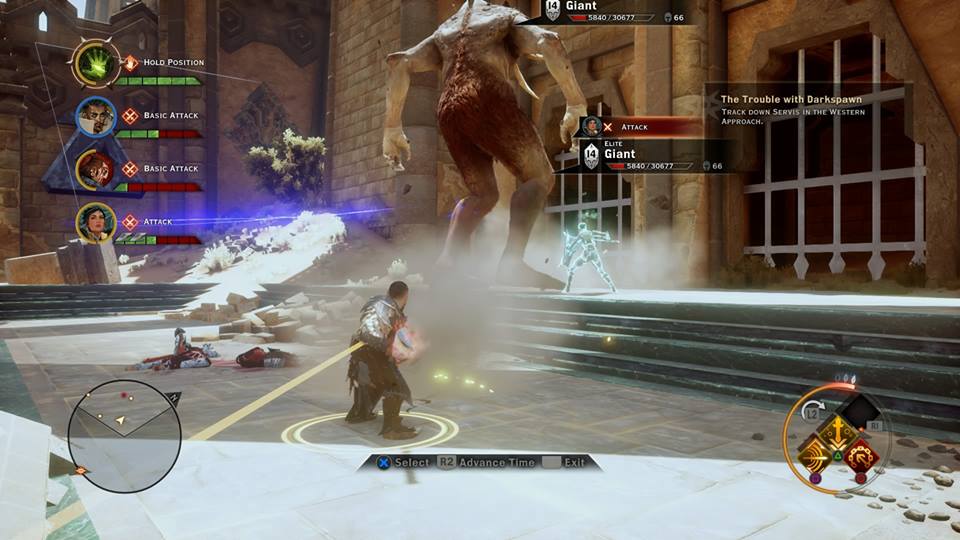
Now, the micromanagement itself can be fun at times when it feels it's earned, such as during boss battles for example or huge skirmishes involving you combating against 6 or more enemies. But to constantly tell every party member to do this or that for every single battle? It can get to be pretty damn exhausting quite frankly. That your companions can't even be intuitive enough to move out of a flaming circle of death seems like a pretty significant oversight. Trying to micromanage a dual-wielding Rogue character in particular requires you to be constantly telling them to hold position, as all melee characters regardless of their health will forever charge towards whatever enemy they can find. A Rogue of course primarily benefits from flanking attacks, however when controlled by the AI they will never actually attack as such and will just routinely rush into the fray and start stabbin'. For a class that is both melee focussed and can only typically take so few attacks before succumbing to death, the amount of micromanagement required to keep a Rogue alive is simply more busywork than should be necessary. Frankly the more I played the game the more it started to feel as if it's all one step away from having to tell them when best to wipe their own ass.
Inquisition does at least include the Tactical Camera, even on consoles now too, allowing you a more efficient, isometric view of the battlefield; however it's still not ideal. In certain situations it can sometimes leave you staring at a bunch of branches, completely obfuscating your view. Certain actions cannot be undertaken within the tactical camera, either. Telling a party member to revive another never seems to work, neither does telling my Inquisitor to close or disrupt the demon-spawning rifts you'll encounter on your travels. Abilities that can ordinarily be chained in real-time--such as a two-handed ability where you'll swing your weapon around until your stamina drains--by holding down the appointed button cannot be chained amidst the Tactical View. Whence told to use such an ability, the character simply does one strike/swing/ect. and then that'll be that, which for some abilities will then put that ability on a cooldown.

The combat itself is at least enjoyable to watch, with all kinds of magical effects spraying everywhere, some superb animation work, and the sound effects are also well done at that. For a time the combat was indeed rather fun, despite the frustrating lack of party AI customisation. But because of how much combat there is in this game, it started to wear out its welcome, especially as the enemy variety isn't quite extensive enough to span a potential 100 hours. It is at least appreciative that your party members' abilities can now essentially be customised however you want; Cassandra doesn't have to be the sword & shield type of warrior and can be specced to specialise in two-handed weapons if you desire. While it at first eliminates the individuality of each party member, after a specific story event they'll unlock their own unique specialisation tree to help distinguish them from one another.
Bugs and varying levels of jank have cropped up here and there as well. Situations such as party members somehow getting stuck in the geometry are easy to giggle at, but crashes taking me back to the PS4 XMB aren't quite as hilarious. One particular bug that sometimes required me to skip through dialogue is another that is hard to forgive. In this current climate of games being released unfinished Inquisition doesn't begin to compare, but the bugs of note are still worth criticising. *Certain issues may have been rectified via the recent patch, however*
While Inquisition has attempted--and in some cases succeeded--to right all of the wrongs Dragon Age II committed, its sloppy attempts at competing with Skyrim does no favours to the ever invasive influence of Mass Effect. Inquisition is most certainly a huge game, one that can undoubtedly take you 100+ hours to witness all of its content. However a significant majority of it all feels like filler, with a pretty weak story to boot, and what few story missions there actually are can barely manage to hold the game together on their own. Dragon Age II is equally as flawed as Inquisition, if not more so. However it's easier to be a little more forgiving because of its unfortunate circumstances; that it had to be developed within such a tight schedule clearly left the developers with their hands tied. Inquisition, however, was supposed to be BioWare getting back on track, to have the time and the resources to make the game theywant to make. If Inquisition truly is that game, then that's pretty damn depressing.
